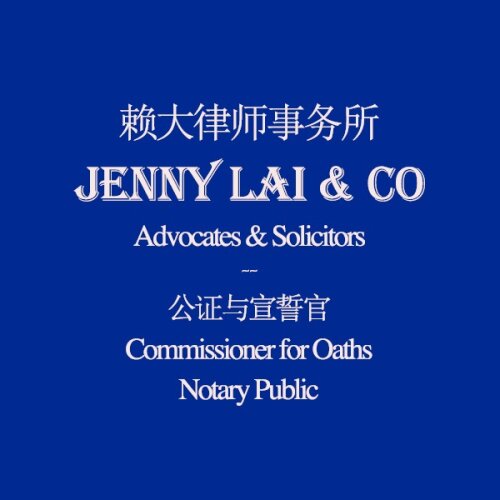Best Landlord & Tenant Lawyers in Chinatown
Share your needs with us, get contacted by law firms.
Free. Takes 2 min.
Free Guide to Hiring a Real Estate Lawyer
List of the best lawyers in Chinatown, Singapore
About Landlord & Tenant Law in Chinatown, Singapore
Landlord and Tenant law in Chinatown, Singapore governs the rights and responsibilities of landlords and tenants in rental properties. It covers issues such as tenancy agreements, rent payments, repairs, evictions, and security deposits.
Why You May Need a Lawyer
You may need a lawyer for various reasons related to Landlord & Tenant issues, such as disputes over rental payments, lease agreements, property maintenance, eviction proceedings, or security deposit disputes. A lawyer can provide legal advice, negotiate on your behalf, and represent you in court if necessary.
Local Laws Overview
Key aspects of Landlord & Tenant law in Chinatown, Singapore include the Residential Tenancies Act, which sets out the rights and obligations of landlords and tenants. It covers issues such as the duration of tenancy agreements, rent increases, maintenance responsibilities, and eviction procedures.
Frequently Asked Questions
1. Can a landlord increase the rent during a tenancy?
Under the Residential Tenancies Act, a landlord can only increase the rent with proper notice and within the guidelines set by the law. They cannot raise the rent arbitrarily.
2. What are my rights as a tenant regarding repairs and maintenance?
As a tenant, you have the right to live in a safe and well-maintained property. Your landlord is responsible for ensuring that necessary repairs are carried out in a timely manner.
3. Can a landlord evict a tenant without proper notice?
No, a landlord must follow the legal eviction procedures outlined in the Residential Tenancies Act, which includes providing the tenant with proper notice and obtaining a court order if necessary.
4. What can I do if my security deposit is not returned at the end of the tenancy?
If your landlord fails to return your security deposit, you may need to seek legal assistance to recover the amount owed to you. A lawyer can help you navigate the process and represent you in court if needed.
5. Can a tenant sublet the rental property to someone else?
Whether or not a tenant can sublet the property depends on the terms of the tenancy agreement. In some cases, subletting may be allowed with the landlord's consent.
6. What should I do if my landlord is not maintaining the property properly?
If your landlord is not fulfilling their maintenance responsibilities, you may need to document the issues and communicate them in writing. If the situation persists, you may need to seek legal advice on how to proceed.
7. Can a landlord enter the rental property without permission?
A landlord must give the tenant proper notice before entering the rental property, except in emergencies. Tenants have the right to privacy and peaceful enjoyment of the property.
8. What are the consequences of breaking a lease agreement early?
If you break a lease agreement before the term is up, you may be liable for penalties or damages as outlined in the agreement. You may need legal advice on how to minimize the financial impact of breaking the lease.
9. Can a landlord discriminate against tenants based on their race, gender, or religion?
No, landlords are prohibited from discriminating against tenants based on protected characteristics such as race, gender, religion, or nationality. If you believe you have been discriminated against, you may need legal advice on how to proceed.
10. How can I ensure my tenancy agreement is legally sound?
To ensure your tenancy agreement is legally sound, you may want to have it reviewed by a lawyer before signing. A lawyer can help you understand your rights and obligations under the agreement.
Additional Resources
For more information on Landlord & Tenant issues in Singapore, you can contact the Small Claims Tribunal, the Consumers Association of Singapore (CASE), or the Singapore Land Authority (SLA) for assistance.
Next Steps
If you are facing legal issues related to Landlord & Tenant in Chinatown, Singapore, it is important to seek legal advice as soon as possible. Contact a lawyer who specializes in Landlord & Tenant law to discuss your situation and explore your legal options.
Lawzana helps you find the best lawyers and law firms in Chinatown through a curated and pre-screened list of qualified legal professionals. Our platform offers rankings and detailed profiles of attorneys and law firms, allowing you to compare based on practice areas, including Landlord & Tenant, experience, and client feedback.
Each profile includes a description of the firm's areas of practice, client reviews, team members and partners, year of establishment, spoken languages, office locations, contact information, social media presence, and any published articles or resources. Most firms on our platform speak English and are experienced in both local and international legal matters.
Get a quote from top-rated law firms in Chinatown, Singapore — quickly, securely, and without unnecessary hassle.
Disclaimer:
The information provided on this page is for general informational purposes only and does not constitute legal advice. While we strive to ensure the accuracy and relevance of the content, legal information may change over time, and interpretations of the law can vary. You should always consult with a qualified legal professional for advice specific to your situation.
We disclaim all liability for actions taken or not taken based on the content of this page. If you believe any information is incorrect or outdated, please contact us, and we will review and update it where appropriate.









